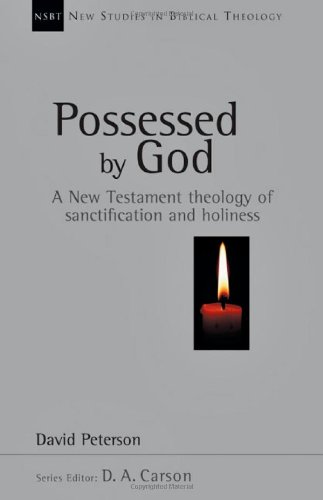It has been about twenty years since I first read this book (I have the original 1995 edition – the first in Carson’s New Studies in Biblical Theology series), and reading it again now has only reinforced my high estimation for it as an essential corrective to traditional theological categories and to our understanding of sanctification itself.
Peterson demonstrates very simply yet conclusively that the way theologians have traditionally talked about “sanctification” is not the way the biblical writers talk about it. This is not to say theologians are substantively wrong in what they affirm, but it is to say that we often mix categories, lack exegetical precision, and therefore confuse concepts that – even though necessarily related – are distinct. In the hands of theologians and preachers (generally) “sanctification” is understood in terms of a progressively improving godliness – a catch-all term that is used to describe how we live the Christian life practically. For the New Testament writers, however, the term consistently, if not exclusively, points to our “consecrated” status as belonging to God in Christ – “definitive” sanctification as John Murray coined it.
To demonstrate the point Peterson surveys all the major New Testament passages that employ the “holiness-sanctification” terminology, and the net result is both a series of insightful expositions of key texts and a clarification of what it means to be sanctified in Christ. Peterson also surveys passages that address “practical” aspects of godly living – a helpful study in itself also – and identifying the categories of thought in the biblical writers.
Nor is this a mere exercise in nit-picking, for “history shows that, when the terminology of sanctification is simply used to describe everything that happens to us after conversion, the definitive emphasis of the New Testament is soon obscured” – and with it the foundational understanding that is so necessary to godly living.
It is one of the tragedies of church history that, in official as well as popular usage, the term ‘saint’ has become too narrowly identified with apostles or outstanding Christian leaders and exemplars. The notion that all Christians are saints by virtue of God’s calling is obscured by this misleading practice. If a particular individual’s sanctity is celebrated, it suggests that personal holiness is in some way a departure from the norm. Worse still, it implies that sainthood is an achievement, not a gift. If someone says, ‘She’s a real saint,’ it ought in truth to mean, “She is a real Christian’! (41).
Agree or disagree with this or that detail of his exposition, no contemporary study of the doctrine of sanctification can afford to neglect the corrective Peterson gives us here. An illuminating and enjoyable read.
Fred Zaspel
Buy the books

Possessed by God